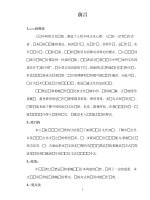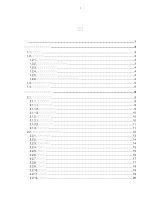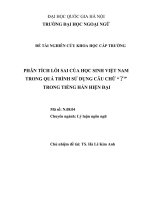Phân tích lỗi sai 30 cặp từ gần nghĩa trong tiếng hán hiện đại của học sinh thpt việt nam
Bạn đang xem bản rút gọn của tài liệu. Xem và tải ngay bản đầy đủ của tài liệu tại đây (180.15 KB, 5 trang )
1
VIETNAM NATIONAL UNIVERSITY, HANOI
UNIVERSITY OF LANGUAGES AND INTERNATIONAL STUDIES
FACULTY OF POST - GRADUATE STUDIES
§ång Quúnh Trang
Adapting reading tasks of ESP materials for the third-year
students at HaiPhong Medical University
Điều chỉnh những nhiệm vụ đọc hiểu theo tài liệu tiếng Anh chuyên
ngành cho sinh viên năm thứ ba tr-ờng Đại học Y Hải Phòng
m.a. minor thesis
Field: English Methodology
Code: 60 14 10
Hanoi, 2010
2
VIETNAM NATIONAL UNIVERSITY, HANOI
UNIVERSITY OF LANGUAGES AND INTERNATIONAL STUDIES
FACULTY OF POST - GRADUATE STUDIES
§ång Quúnh Trang
Adapting reading tasks of ESP materials for the third-year
students at HaiPhong Medical University
Điều chỉnh những nhiệm vụ đọc hiểu theo tài liệu tiếng Anh chuyên
ngành cho sinh viên năm thứ ba tr-ờng Đại học Y Hải Phòng
M.A.MINOR THESIS
Field: English Methodology
Code: 60 14 10
Supervisor: Nguyn Bng, M.A
Hanoi, 2010
6
Table of Contents
Declarations
Acknowledgement
Abstract
Table of contents
List of abbreviation
List of figures, charts and tables
Part I. Introduction
1
I. Rationale
1
II. Aims of the study
2
III. Methods of the study
3
IV. Scope of the study
3
V. Design of the study
3
Part II. Development
5
Chapter I. Literature review
5
I.1. An overview of ESP
5
I.1.1. Definition of ESP
5
I.1.2. Types of ESP
6
I.1.3. Characteristics of ESP
8
I.2. Material adaptation
9
I.2.1. Definition of material adaptation
9
I.2.2. Purposes of material adaptation
9
I.2.3. Techniques of material adaptation for teaching reading
10
I.2.3.1. Adaptation as addition
10
I.2.3.2. Adaptation as change
11
I.3. An overview of reading
13
7
I.3.1. Definition of reading and reading comprehension
13
I.3.2. Classification of reading
14
I.3.2.1. According to manner
15
I.3.2.1.1. Reading aloud
15
I.3.2.1.2. Silent reading
15
I.3.2.2. According to purposes
16
I.3.2.2.1. Skimming
16
I.3.2.2.2. Scanning
16
I.3.2.2.3. Intensive reading
16
I.3.2.2.4. Extensive reading
17
I.4. Concluding remarks
Chapter II. The study
II.1. Situational analysis
17
18
18
II.1.1. ESP teaching and learning situation at HPMU
18
II.1.2. The material description
18
II.1.3. The course objective
19
II.2. Research methodology
20
II.2.1. Subjects of the study
20
II.2.1.1. The teachers
20
II.2.1.2. The students
20
II.2.2. Data collection instrument
21
II.2.2.1. Questionnaires
21
II.2.2.2. Follow-up class observation
21
II.3. Procedures
22
II.4. Data analysis
23
II.4.1. Questionnaires
23
II.4.1.1. Evaluation of the effectiveness of reading tasks in the ESP materials 23
II.4.1.2. The attitudes and evaluation of the reading texts in the current
8
textbook
24
II.4.1.3. Needed topics perceived by the students
26
II.4.1.4. Students‟ attitudes towards pre-reading activities
26
II.4.1.4.1. The frequency of using extra pre-reading activities
designed by the teachers (responded by the students)
II.4.1.4.2. Students‟ attitudes towards given pre-reading activities
26
27
II.4.1.5. The post-reading activities used by the teachers
28
II.4.1.6. The necessity of adapting the reading tasks in the ESP materials
29
II.4.1.7. The students‟ and teachers‟ difficulties in learning and teaching
medical reading (respectively)
30
II.4.1.8. The students‟ expectations from the teachers and reading
activities employed by the teachers to help their students
overcome difficulties
31
II.4.2. Follow-up class observation
32
II.5. Concluding remarks
33
Chapter III. some suggested techniques of adapting reading
tasks for the third-year students at hai phong
medical university
34
III.1. Replacing
34
III.2. Supplementing
35
III.3. Extending
38
Part III. Conclusion
40
1. Summary of the study
40
2. Limitations of the study
41
3. Suggestions for further study
41
References









